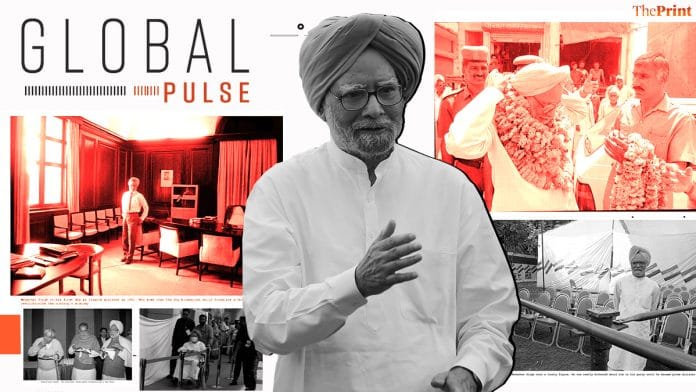Tributes are pouring in for Dr Manmohan Singh from global leaders as well as publications, commemorating his life in service of India.
The former prime minister of India died late Thursday night, and both Indian and global media have been celebrating his legacy. Nearly all reports call him “soft-spoken” and credit him for being the architect of economic change in India, noting the respect he courted worldwide.
The BBC calls him a “consensus builder”, a “low-profile leader”, and praises his foreign policy as pragmatic. Another story refers to him as a “soft-spoken technocrat”, and lists out five of his decisions that had a last impact on over a billion Indians: economic liberalisation, his “reluctant” decision to accept the PM position, introducing new laws on the rights to information, education and identity and launching MGNREGA, his apology for anti-Sikh riots as a Sikh PM, and the 2008 nuclear deal with the US.
The Washington Post’s headline says Singh “presided over dynamic change” in India, calling him the “blue-turbaned Sikh with the cerebral image and oversize glasses.”
“Mr. Singh took power during one of the most dynamic chapters in India’s postcolonial history. His leadership marked a new era in India-U.S. relations, which warmed significantly with the signing of a historic nuclear-energy deal initiated in 2005, during the George W. Bush administration,” the Post writes.
It also describes how during his tenure, India and Pakistan came very close to negotiating a “historic deal” over Kashmir, until the 26/11 Mumbai attacks took place. “The negotiations, perhaps the closest that India and Pakistan ever came to resolving one of Asia’s most explosive and enduring disputes, fell apart at the last minute,” the story says.
It also goes into Singh’s childhood, studying under the dim lights of kerosene-lamps in his village in what is now Pakistan, which had neither running water nor electricity. “With his simple clothing and schoolteacher-chunky black shoes, he led a frugal life when many Indian leaders were infamous for fancy clothing and frequent meals at five-star hotels,” the Post reports.
It also makes note of his trademark “self-effacing style”, referencing his first Independence Day speech after assuming power, in which he said he had no promises to make—“only promises to keep.”
The New York Times also calls him “cerebral” and “soft-spoken”, situating him as a member of the generation whose “early lives were moulded by the mass migrations” that followed the partition of India.
“Such was his fabled reticence that he gave only a handful of news conferences, even as the economy slowed and his government became mired in accusations of scandals related to the allocation of cellphone licenses and coal fields,” the Times reports.
As finance minister and former governor of the RBI, the Times writes, Singh “oversaw changes that set his vast, turbulent nation of more than 1.1 billion people on a path toward becoming a regional economic dynamo.”
It also quotes Sonia Gandhi’s statement about him in late 2018, in which she said that Singh’s “persona and policies had a profound calming effect” on India when it was on the edge, with frayed collective nerves and a secular fabric under assault.
The Guardian notes his shyness and reticence, and the fact that he was India’s first non-Hindu prime minister. “Singh, one of 10 siblings, was so determined to get an education, he would study at night under streetlights to escape the noise in his joint-family home. His brother, Surjit Singh, recalled his father ‘used to say Manmohan will be the prime minister of India” because he “always had his nose in a book,’” the Guardian writes.
His “deft economic hand” also marked his first term as prime minister, while his second term was mired in corruption scandals, the story says. “Singh, who is survived by his wife Gursharan Kaur and three daughters, famously described politics as ‘the art of the possible’ and said toward the end of his second term as prime minister that ‘history will be kinder to me than the media’,” the tribute ends.
Also read: India overtakes China to become Asia’s top IPO market & Kohli-Konstas collide Down Under






